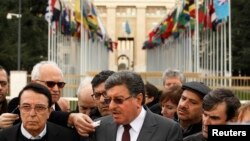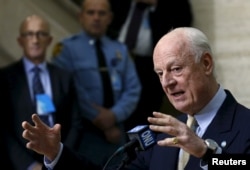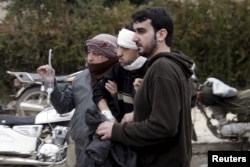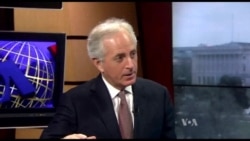Fragile indirect negotiations to end Syria’s nearly 5-year conflict slipped into disarray again on their second day Tuesday, with neither side holding formal sessions with the U.N. envoy in Geneva.
Meanwhile, the Syrian government on Tuesday allowed trucks carrying humanitarian aid to travel into a rebel-held area near Damascus as a demonstration of good will. The opposition called it an “empty” gesture as long as government forces continue to step up their offensive.
The Syrian government delegation said it did not open formal negotiations as scheduled Tuesday with U.N. envoy Staffan de Mistura, saying the basic framework or agenda of the talks had yet to be established, and the process had not yet moved beyond the preparatory phase.
“We are waiting to find out the procedural issues, who will negotiate. Until now nothing is clear: one or two or three or four delegations? There is no clear answers,” Bashar Jaafari, the chief Syrian government representative told reporters in Geneva.
At the same time, the main opposition group canceled a meeting it had scheduled with de Mistura on Tuesday, saying the escalating assault by Syrian government forces and their Russian allies are reason not to pursue negotiations.
De Mistura declared the talks officially under way on Monday, after persuading the opposition to join the talks. “As far as we are concerned, their arrival to the Palais des Nations and initiating the discussion with us is the official beginning of the Geneva talks,” the UN envoy said.
The formal start came exactly one week after they were originally scheduled to begin.
Talks were delayed by discussions of who should represent the opposition, then by an opposition boycott and the opposition’s demands for an end to air strikes and a lifting of blockades on rebel-held areas.
De Mistura offered those assurances. On Monday, he said discussions to pause the assault are part of a framework that was decided during multinational discussions held in Vienna last year that cleared the way for the talks. “There was a message in the Vienna meetings that when the Geneva talks will actually start, in parallel there should be a beginning of a serious discussion about cease-fire,” de Mistura said.
'Good faith' urged
The head of the Syrian government delegation this week called on the opposition to “show good faith and devote to serious discussions.”
But both sides continued to accuse each other of lacking good will.
Prospects for a cease-fire seemed especially uncertain after the Syrian government, with Russia’s assistance, launched a massive offensive against rebel forces this week.
Syrian state media say government forces on Tuesday took the village of Hardatneen, north of Aleppo, Syria’s second largest city.
Observers say forces loyal to President Bashar al-Assad have recaptured several other villages near Aleppo over the last two days.
The opposition is threatening to walk out of the Geneva talks if the air strikes do not stop and if the government does not lift the siege they say is preventing humanitarian aid from reaching civilians in rebel-held areas.
A spokesman for the International Committee of the Red Cross on Tuesday said the Syrian Arab Red Crescent had been allowed to deliver at least 14 truckloads of humanitarian supplies to al-Tal, near Damascus.
But members of the opposition delegation in Geneva said the gesture would make little difference for the peace process. One representative, Ahmad Ramadan, said the only way to save the talks is for the United Nations and the United States to “force an end to the bombardment and the targeting of civilians.”
The regime’s and Russia’s actions gravely threaten the political process at this early stage,” another opposition member, Farah Atassi, said.
U.S. Secretary of State John Kerry, who headed to London for an international donors conference on Syria Wednesday, called for an end to the air strikes and said a cease-fire should be implemented soon.
"We are all extraordinarily sympathetic to the limits of propriety and common sense in the opposition sitting at the table while someone continues to bomb them,'' Kerry said in Rome, where he attended a meeting of coalition members fighting the Islamic State group.
In London, Kerry was expected to announce significant new contributions to support relief efforts for Syrian refugees.
WATCH: Related video, U.S. Senator Bob Corker speaks to VOA about Syria talks

















